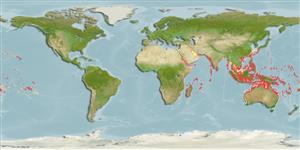Environment: milieu / climate zone / depth range / distribution range
นิเวศวิทยา
เกี่ยวกับทะเล,น้ำเค็ม เกี่ยวกับหินโสโครก; ไม่มีการอพยพย้ายถิ่น; ระดับความลึก 0 - 55 m (Ref. 7247). Tropical; 32°N - 36°S, 24°E - 128°W
Indo-Pacific: Red Sea and East Africa to the Line and Pitcairn islands, north to southern Japan, south to Sydney, Australia. Not found in the Hawaiian and Marquesan islands.
ขนาด / น้ำหนัก / Age
Maturity: Lm ? range ? - ? cm
Max length : 14.0 cm TL เพศผู้/กระเทย; (Ref. 89972); น้ำหนักสูงสุดที่มีการรายงาน: 45.21 g (Ref. 126022)
Short description
เครื่องมือที่ใช้ในการแยกชนิดสัตว์,สิ่งมีชีวิตออกจากกัน | สัณฐานวิทยา | ความยาวต่างๆ
เงี่ยงครีบหลัง (รวม) : 12; ก้านครีบอ่อนที่หาง (รวม) : 14 - 16; เงี่ยงครีบก้น: 2; ก้านครีบอ่อนที่ก้น: 14 - 15. Juveniles overall black with scale centers bluish; white blotch on forehead and upper sides; all fins black except the transparent pectoral and outer portion of soft dorsal rays. Geographic and behavioral color of adults variable; no spot on forehead; spot on upper sides very reduced; head and fins normally black; scales with black margins. Margins of preorbital, suborbital and preoperculum finely serrated (Ref. 2746). Nuptial fish generally paler color. Body depth 1.4-1.6 in SL (Ref. 90102).
Adults inhabit coral and rocky reefs, juveniles often commensal with large sea anemones, sea urchins, or small coral heads (Ref. 4391, 48636). They occur in small to large aggregations. Stomach contents include algae, copepods, and other planktonic crustaceans (Ref. 7247). Oviparous, distinct pairing during breeding (Ref. 205). Eggs are demersal and adhere to the substrate (Ref. 205). Males guard and aerate the eggs (Ref. 205). Diurnal species (Ref. 54980; 120737). Minimum depth reported taken from Ref. 128797.
Oviparous, distinct pairing during breeding (Ref. 205). Eggs are demersal and adhere to the substrate (Ref. 205). Males guard and aerate the eggs (Ref. 205). Courtship characterized by male 'signal-jumping'. Captive pair reported to spawn thrice monthly with a total of 17 over a 7-month period (Ref. 2856). While protogyny was originally proposed for this species, recent studies confirmed gonochorism in the form of non-functional hermaphroditism (Ref. 103751).
Allen, G.R., 1991. Damselfishes of the world. Mergus Publishers, Melle, Germany. 271 p. (Ref. 7247)
IUCN Red List Status (Ref. 130435: Version 2024-2)
Threat to humans
Harmless
Human uses
การประมง: มีการค้าเพียงเล็กน้อย; สถานที่แสดงสัตว์และพืชน้ำ: การค้า
เครื่องมือ
Special reports
Download XML
แหล่งที่มาจากอินเตอร์เน็ต
Estimates based on models
Preferred temperature (Ref.
123201): 24.6 - 29, mean 28 °C (based on 1240 cells).
Phylogenetic diversity index (Ref.
82804): PD
50 = 0.5005 [Uniqueness, from 0.5 = low to 2.0 = high].
Bayesian length-weight: a=0.03467 (0.02169 - 0.05544), b=2.93 (2.80 - 3.06), in cm total length, based on LWR estimates for this species & (Sub)family-body (Ref.
93245).
ระดับชั้นอาหาร (Ref.
69278): 3.0 ±0.24 se; based on food items.
ความสามารถในการกลับคืนสู่ปกติ (Ref.
120179): ความสูง, เวลาต่ำสุดที่จะทำให้ประชากรเพิ่มขึ้นเป็น 2 เท่าใช้เวลาน้อยกว่า 15 เดือน (Fec=20,000-25,000).
Fishing Vulnerability (Ref.
59153): Low vulnerability (10 of 100).
Nutrients (Ref.
124155): Calcium = 90.3 [45.4, 146.6] mg/100g; Iron = 0.802 [0.476, 1.335] mg/100g; Protein = 18 [17, 19] %; Omega3 = 0.115 [0.067, 0.193] g/100g; Selenium = 27.9 [13.9, 57.3] μg/100g; VitaminA = 123 [33, 443] μg/100g; Zinc = 1.48 [0.97, 2.15] mg/100g (wet weight);
